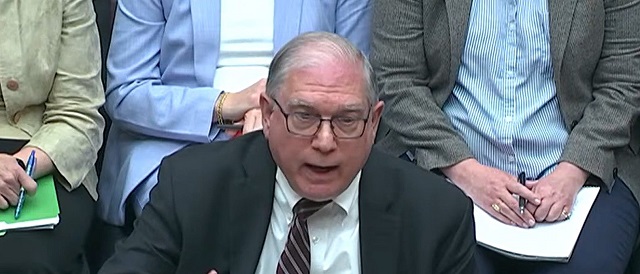COVID-19
House COVID Committee Confirms What We Have Long Suspected — The Feds Really Hate Transparency

 From the Daily Caller News Foundation
From the Daily Caller News Foundation
Last week details emerged from the House Select Subcommittee on the Coronavirus Pandemic, confirming what government transparency advocates long suspected: Federal bureaucrats are purposefully stonewalling the American people’s right to know about their government.
Republican Kentucky Rep. James Comer, who chairs the full House Oversight and Accountability Committee, read from an email that Dr. David Morens, a top aide to Dr. Anthony Fauci, sent claiming that a staffer inside the National Institutes of Health (NIH) had shown him how to erase records requested by the public.
He was corresponding with Peter Daszak, president of EcoHealth Alliance, the organization that used tax dollars to fund controversial gain-of-function research in Wuhan, where the COVID outbreak began. The Department of Health and Human Services has since suspended funding of EcoHealth Alliance.
Morens wrote: “I learned from our FOIA (Freedom of Information Act) lady here how to make emails disappear after I am FOIA’d, but before the search starts. So, I think we are all safe. Plus, I deleted most of those earlier emails after sending them to Gmail.”
The implications for government transparency are enormous. How often do NIH staffers conceal what they do with our tax dollars? Why did a FOIA officer feel empowered to assist subjects of FOIA requests? How else do FOIA offers interfere with these requests? Has this behavior spread to the Centers for Disease Control and other agencies?
Our auditors at OpenTheBooks.com can speak to the problem. We have spent years — and gone to court — to force NIH to reveal the royalties paid to government scientists through medical innovation licensing.
When Americans are considering a drug or therapeutic recommended by public health officials, they deserve to understand all the financial stakes at play. Were any decision makers receiving payments? Were they continuing more lucrative research at the expense of other public health solutions?
For many, the question looming largest has been whether the relentless COVID vaccine push was driven by a potential windfall for NIH and certain scientists there.
When we first filed a FOIA, the agency ignored us and then refused to release the information.
After suing, NIH was required to release the information and began doing so incrementally due to the high volume of data. Tallied from 2009 through 2020, it amounted to an enormous sum–over $325 million paid by private companies to NIH and its scientists over 56,000 transactions.
Previously, we’d also discovered that Dr. Fauci, the face of the nation’s COVID response, was the highest compensated bureaucrat in the country. He out-earned President Biden. He out-earned his own boss, then-Acting NIH Director Lawrence Tabak.
Along with Fauci, who scoffed at concerns about royalty payments, Tabak faced questions from Congress.
In a March 2023 budget hearing, Rep. John Moolenaar told Tabak an obvious truth: every single, secret royalty payment represents a potential conflict of interest.
“To me, one of the biggest concerns people had during this last couple years is: Were they getting truthful information from their government? Could they trust what people were saying about the medicines? To me, that creates a very disturbing appearance.”
“The idea that people were getting a financial benefit from certain research that was done and grants that were awarded, that to me is the height of the appearance of a conflict of interest,” Moolenaar concluded.
The lawmaker urged NIH to make the money trail more transparent.
It was Tabak in the hot seat again last week, as Comer recited Morens’ outrageous email message.
Was the behavior he described consistent with NIH policy, Comer asked? “It is not,” Tabak responded flatly.
Did the FOIA team at NIH help its colleagues avoid transparency? “I certainly hope not,” Tabak offered.
Hope doesn’t suffice in this situation. It demands that lawmakers strengthen transparency law, update it for the 21st century and create some consequences for bad actors.
There are a few primary ways bureaucrats and decisionmakers violate the spirit of the law.
First, they overuse a series of exemptions designed to protect national security secrets or privacy laws. Too much is omitted through these exceptions; the American people deserve the full truth.
When documents are produced, they’re too often rendered useless through excessive redactions. We’re still fighting in real time to get more pieces of the royalty puzzle revealed.
Next, unreasonable delays are blamed on staffing levels, while many FOIA-related roles sit open. Agencies must prioritize filling those seats and Congress should appropriate more of them as needed.
Finally, we have the behavior Morens describes. A post facto effort to simply abscond with the information. It’s not just a policy violation but an affront to the spirit of the Freedom of Information Act. What consequences do these staffers ever truly face?
Until we get serious about protecting transparency, “FOIA lady” will be a duly anonymous symbol of what many have suspected: government employees hustling to cover their tracks.
Adam Andrzejewski is founder & CEO of OpenTheBooks.com, the nation’s largest private database of public spending.
2025 Federal Election
Conservatives promise to ban firing of Canadian federal workers based on COVID jab status

From LifeSiteNews
The Conservative platform also vows that the party will oppose mandatory digital ID systems and a central bank digital currency if elected.
Pierre Poilievre’s Conservative Party’s 2025 election platform includes a promise to “ban” the firing of any federal worker based “solely” on whether or not they chose to get the COVID shots.
On page 23 of the “Canada First – For A Change” plan, which was released on Tuesday, the promise to protect un-jabbed federal workers is mentioned under “Protect Personal Autonomy, Privacy, and Data Security.”
It promises that a Conservative government will “Ban the dismissal of federal workers based solely on COVID vaccine status.”
The Conservative Party also promises to “Oppose any move toward mandatory digital ID systems” as well as “Prohibit the Bank of Canada from developing or implementing a central bank digital currency.”
In October 2021, the Liberal government of former Prime Minister Justin Trudeau announced unprecedented COVID-19 jab mandates for all federal workers and those in the transportation sector. The government also announced that the unjabbed would no longer be able to travel by air, boat, or train, both domestically and internationally.
This policy resulted in thousands losing their jobs or being placed on leave for non-compliance. It also trapped “unvaccinated” Canadians in the country.
COVID jab mandates, which also came from provincial governments with the support of the federal government, split Canadian society. The shots have been linked to a multitude of negative and often severe side effects, such as death, including in children.
Many recent rulings have gone in favor of those who chose not to get the shots and were fired as a result, such as an arbitrator ruling that one of the nation’s leading hospitals in Ontario must compensate 82 healthcare workers terminated after refusing to get the jabs.
Beyond health concerns, many Canadians, especially Catholics, opposed the injections on moral grounds because of their link to fetal cell lines derived from the tissue of aborted babies.
COVID-19
RFK Jr. Launches Long-Awaited Offensive Against COVID-19 mRNA Shots

 Nicolas Hulscher, MPH
Nicolas Hulscher, MPH
As millions of Americans anxiously await action from the new HHS leadership against the COVID-19 mRNA injections—injected into over 9 million children this year—Robert F. Kennedy Jr. has finally gone publicly on the offensive:
Let’s go over each key point made by RFK Jr.:
The recommendation for children was always dubious. It was dubious because kids had almost no risk for COVID-19. Certain kids that had very profound morbidities may have a slight risk. Most kids don’t.
In the largest review to date on myocarditis following SARS-CoV-2 infection vs. COVID-19 vaccination, Mead et al found that vaccine-induced myocarditis is not only significantly more common but also more severe—particularly in children and young males. Our findings make clear that the risks of the shots overwhelmingly outweigh any theoretical benefit:
The OpenSAFELY study included more than 1 million adolescents and children and found that myocarditis was documented ONLY in COVID-19 vaccinated groups and NOT after COVID-19 infection. There were NO COVID-19-related deaths in any group. A&E attendance and unplanned hospitalization were higher after first vaccination compared to unvaccinated groups:
So why are we giving this to tens of millions of kids when the vaccine itself does have profound risk? We’ve seen huge associations of myocarditis and pericarditis with strokes, with other injuries, with neurological injuries.
The two largest COVID-19 vaccine safety studies ever conducted, involving 99 million (Faksova et al) and 85 million people (Raheleh et al), confirm RFK Jr.’s concerns, documenting significantly increased risks of serious adverse events following vaccination, including:
- Myocarditis (+510% after second dose)
- Acute Disseminated Encephalomyelitis (+278% after first dose)
- Cerebral Venous Sinus Thrombosis (+223% after first dose)
- Guillain-Barré Syndrome (+149% after first dose)
- Heart Attack (+286% after second dose)
- Stroke (+240% after first dose)
- Coronary Artery Disease (+244% after second dose)
- Cardiac Arrhythmia (+199% after first dose)
And this was clear even in the clinical data that came out of Pfizer. There were actually more deaths. There were about 23% more deaths in the vaccine group than the placebo group. We need to ask questions and we need to consult with parents.
Actually, according to the Pfizer’s clinical trial data, there were 43% more deaths in the vaccine group compared to the placebo group when post-unblinding deaths are included:
We need to give people informed consent, and we shouldn’t be making recommendations that are not good for the population.
Public acknowledgment of the grave harms of COVID-19 vaccines signals that real action is right around the corner. However, we must hope that action is taken for ALL age groups, as no one is spared from their life-reducing effects:
Alessandria et al (n=290,727, age > 10 years): People vaccinated with 2 doses lost 37% of life expectancy compared to the unvaccinated population during follow-up.
Epidemiologist and Foundation Administrator, McCullough Foundation
Please consider following both the McCullough Foundation and my personal account on X (formerly Twitter) for further content.
-

 Business2 days ago
Business2 days agoIs Government Inflation Reporting Accurate?
-

 2025 Federal Election2 days ago
2025 Federal Election2 days agoCarney’s Hidden Climate Finance Agenda
-

 2025 Federal Election2 days ago
2025 Federal Election2 days agoWhen it comes to pipelines, Carney’s words flow both ways
-

 2025 Federal Election2 days ago
2025 Federal Election2 days agoStudy links B.C.’s drug policies to more overdoses, but researchers urge caution
-

 2025 Federal Election2 days ago
2025 Federal Election2 days agoPolls say Canadians will give Trump what he wants, a Carney victory.
-

 2025 Federal Election1 day ago
2025 Federal Election1 day agoCarney Liberals pledge to follow ‘gender-based goals analysis’ in all government policy
-

 2025 Federal Election1 day ago
2025 Federal Election1 day agoPoilievre’s Conservatives promise to repeal policy allowing male criminals in female jails
-

 Also Interesting2 days ago
Also Interesting2 days agoIf You Frequently Travel, A Second Phone Number Can Be A Cost Effective Solution












